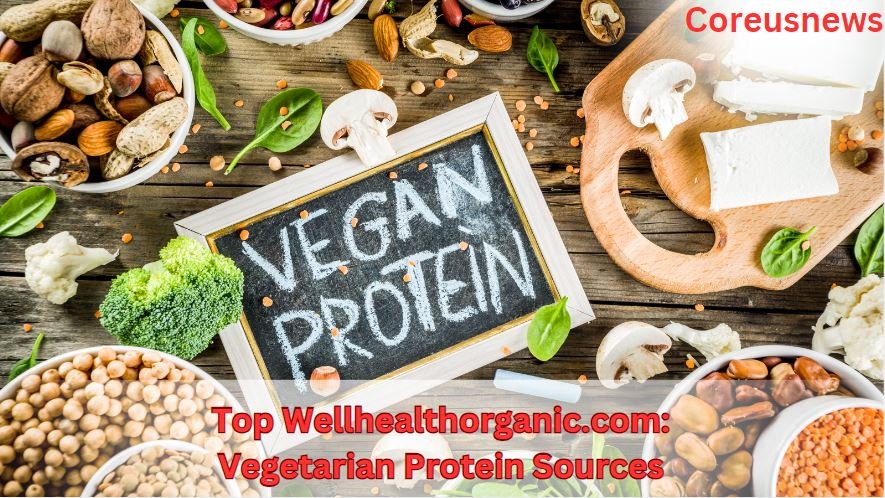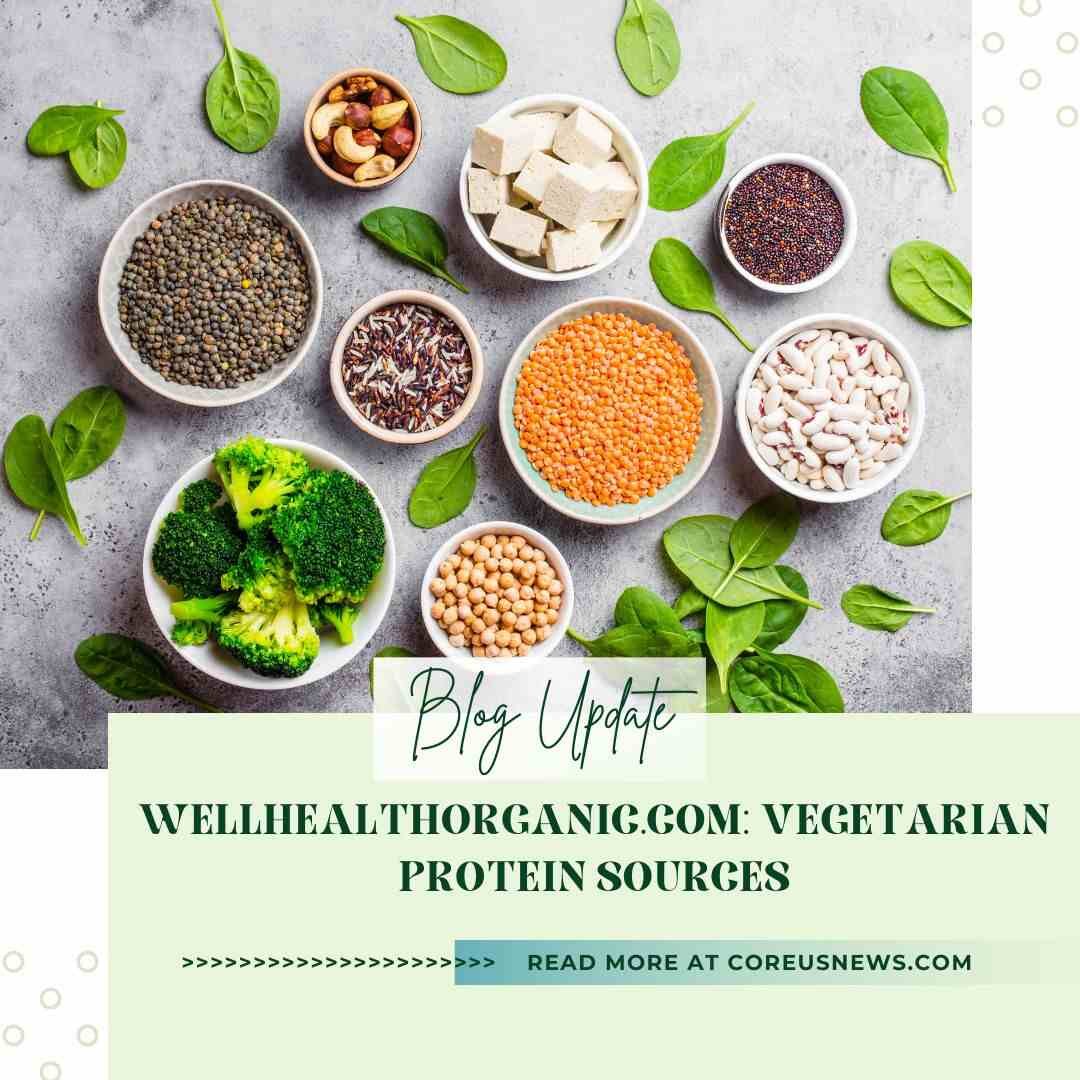Getting rid of foods of animal origin is beneficial to our health and the health of our environment, especially as far as proteins are concerned. This offers great information on wellhealthorganic.com: vegetarian protein sources, stressing on its advantages, nutritional value, and the effect of vegetarian protein on the environment. Another subject discussed throughout the helpful steps for those who decided to turn to vegetarianism or already follow this diet.
Understanding Vegetarianism and Protein Needs
What is Vegetarianism?
Vegetarianism is a type of diet that doesn’t include animal products such as meat, poultry, or any seafood products. Instead, it entails taking plant-source foods in the form of vegetables, fruits, legumes, grains, nuts, and seeds, among others. Milk products and eggs can also be allow depending on the kind of vegetarianism that one observes (lacto vegetarian and ovo vegetarian).
Why is protein important?
Protein is a macronutrient that is indispensable as amino acids, which are use to form tissues and muscles, to create enzymes and hormones, and to support immunity. Protein for the vegetarian is extremely crucial, as they need to make sure that they get the right balance of proteins into the body to help with the body’s metabolism, growth, and repair.
Benefits of Wellhealthorganic.com: Vegetarian Protein Sources
Nutritional Advantages
Many plant protein sources contain other nutrients that are consider important, including vitamins and minerals as well as fiber. These nutrients help to offer several health advantages, such as an improved digestion system, improved body weight control, and improved heart health.
Health Benefits
Dietary protein from vegetable products has a significant inverse relationship with chronic diseases, including cardiovascular diseases, hypertension, and certain cancers. High amounts of fiber in most plant foods also contribute to digestion health and an optimal balance of gut healthy flora, a very important aspect of overall health.
Environmental Impact
It has found that the decision to opt for plant proteins rather than animal ones can make a big difference in the impact on the environment. Consuming higher amounts of plant-based foods and lower amounts of animal-based foods is associate with lower levels of water and land use and also emits fewer greenhouse gases than diets with more animal-source foods.
Top Wellhealthorganic.com: Vegetarian Protein Sources

Legumes
Beans, lentils, and chickpeas are among the best protein foods that can be obtain from a vegetarian meal plan. Not only do they have a high protein content, but they also contain fiber, iron, and other nutrients. For instance, lentils contain about 18 grams of protein in a cook portion, which is why they are considered a good source of protein.
Nuts and Seeds
Most of the nuts and seeds are rich in nutrients and protein and contain fats that are good for the health. Almonds, chia seeds, and hemp seeds are among foods that are rich in protein. For example, one serving of almonds, which is a quarter cup, has approximately 7 grams of protein, and 2 tablespoons of chia seeds give you 4 grams of protein.
Whole Grains
Carbohydrate foods such as whole grain foods, including quinoa, brown rice, and oats, contain carbohydrates in addition to a reasonable amount of proteins. Among the whole spectrum of grains, we are oblige to mention quinoa, which can be an example of a complete protein source because it contains all the nine essential amino acids. Quinoa: Interesting facts, Quinoa contains 8 grams of protein per cup of cooked quinoa.
Soy Products
Tofu, tempeh, and edamame are some of the soy products that are good examples of matters that contain complete protein. For instance, tofu brings about 10 grams of protein per half-cup serving. These vegetables can be eaten cook in pans and used in different methods, such as salads. hence, they are common in vegetarian diets.
Wellhealthorganic.com: Vegetarian Protein Sources for Weight loss
High Protein, Low-Calorie Foods
That is why, when selecting foods meant to facilitate this process, it is advisable to go for foods that are rich in protein but low in calories. Other sources of carbohydrates include legumes, which are rich in proteins and hence help to build muscle and repair it; besides being low in calories, nuts and seeds.
Fiber-Rich Choices
It is recommend to increase the intake of fiber-containing foods with the addition of whole grains and green vegetables, which include quinoa, spinach, and broccoli, since they can increase satiety and improve digestion.
Plant-Based Protein Supplements
Healthy individuals who have certain difficulties with the consumption of protein-containing foods can turn to plant-based protein supplements. Another option is pea protein powder and soy protein powders that can be incorporate in the formation of smoothies or added to nuts, vegetables, or fruits to enhance protein content without adding too much calorie or fat content.
Balanced Meal Planning
The problem of how to achieve weight loss and create a workable diet plan should also entail the choice of vegetarian proteins. Eating proteins in every meal and conjugating them with healthy fats and carbohydrates guarantees the body gets all the required nutrients as you trim down.
Indian vegetarian protein sources
Lentils (Dal)
Lentils are widely use in India and are very famous for being high in protein and fiber content. It is versatile as it can be incorporate in soups, stews, curries, and salads, amongst others.
Chickpeas (Chana)
Chickpeas are another pulse that is widely use and has many nutritional values, such as being rich in protein. They are popularly employee in Indian foods such as Chana masala and can also be incorporate in a salad bowl or some snacks like falafel.
Paneer (Indian Cottage Cheese)
Paneer is known to a very common source of protein as well as calcium for the population of India. This is commonly incorporate in paneer tikka, Palak paneer, and many more dishes, thus making it a healthy and rich food substitute for meat products.
Soybeans
Soybean, either in the form of tofu or in the form of soy chunks, is a very popular ingredient for vegetarian dishes in India. This is also a source of protein, although not as rich as meat, beef, fish, or poultry. These can be prepare in a number of ways: stir-fried, curried, etc.
How to Incorporate Vegetarian Protein into Your Meal Plan
Balanced Meals
One can simply endeavor to incorporate a vegetarian protein source in every meal to be certain of meeting one’s daily protein needs. Combining protein with vegetables and wholemeal items will make a good meal without leaving you hungry.
Snack Options
Some of the recipe ideas dealing with protein include: It is advisable to take snacks with lots of proteins in the middle of the day to avoid getting weaker. Ideas on how to hold them include having a shelled nut containing trail mix or yogurt sprinkling of seeds.
Recipe Ideas
Try out different foods in order to come up with those that will bring out the essence of vegetarian protein. Cooking healthy meals is also easier if one takes a little time in preparing complex meals; lentil soup, cooked Quinoa salad and tofu stir fry are some examples of meals that have high protein content.
Wellhealthorganic.com: Vegetarian Protein Sources
Protein Quality
One of the major problems regarding vegetarian diets is how sufficient and of good quality the protein sources are. Most of the protein in plants isn’t considered a complete protein because they are not filled with all the essential amino acids, but one can obtain all the required amino acids if one takes different protein sources during a day.
Digestibility
The other issue is the bioavailability of the plant proteins as they are compared to animal proteins. Techniques such as combined cooking, germination, and fermentation enhance the availability of nutrients in legumes and grains.
Affordable vegetarian protein sources
It is not a must that one has to spend a lot of money when on a vegetarian diet with lots of proteins. Further, the cheap sources of protein include legumes, beans, eggs, as well as Greek yogurt. On the same note, tofu and tempeh as protein-rich foods are cheap ways to obtain adequate amounts of proteins for the body depending on many uses in recipes.
Conclusion
Feasibly Wellhealthorganic.com: Vegetarian Protein Sources one can consume required protein from a wide range of intake foods, including different legumes, nuts, seeds, whole grain products, soy products, and dairy products’ alteratives. This approach enhances AH and has positive impacts on sustainability and environmental conservation, thus making vegetarianism a sustainable strategy for AH in the long run.
FAQ’s
Legumes, nuts, seeds, soy products, and whole grains are top vegetarian protein sources.
Yes, with a variety of plant-based proteins, vegetarians can meet muscle-building protein needs.
Combine different plant-based proteins, like grains and legumes, to get all essential amino acids.
Yes, options like beans, lentils, tofu, and eggs offer protein at a lower cost than meat.
Plant-based proteins can reduce the risk of chronic diseases and improve digestion
Read More : coreusnews.com



